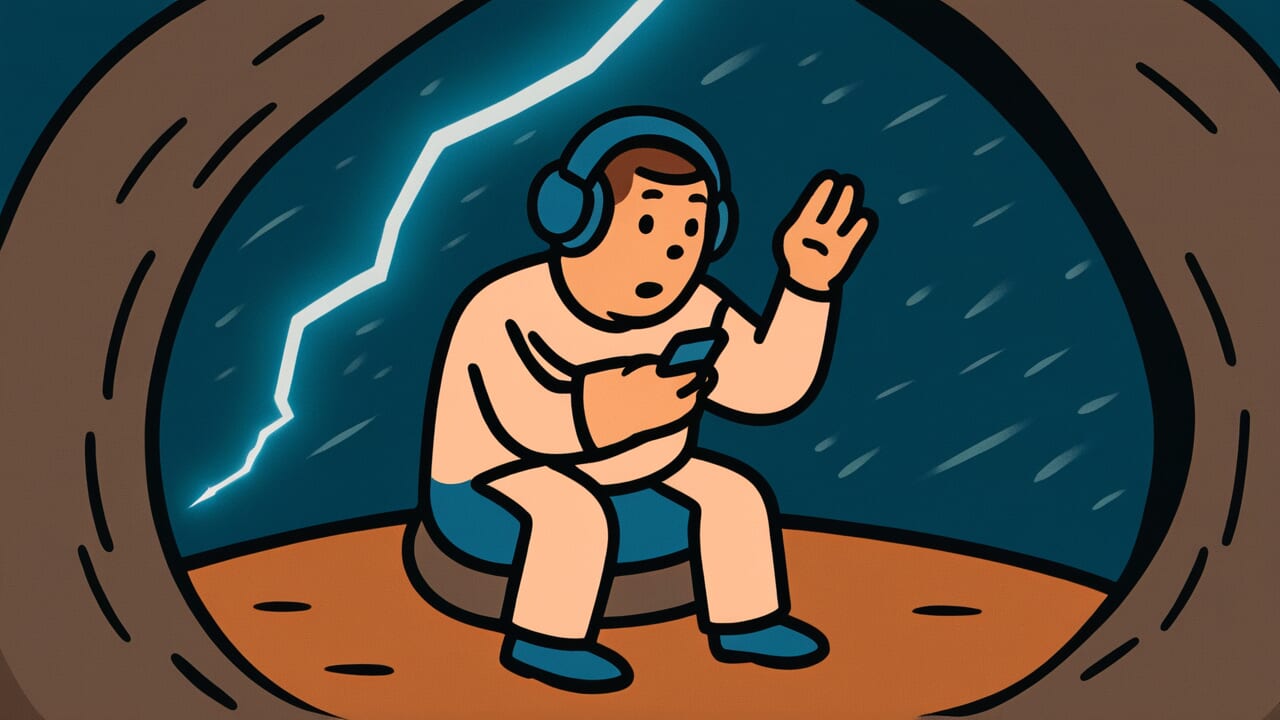How to Read “Hearing thunder in a cellar”
Anagura de kaminari kiku
Meaning of “Hearing thunder in a cellar”
“Hearing thunder in a cellar” is a proverb that describes someone who is overly cautious or excessively timid. It depicts a person who is already in a safe place but still hides in an underground cellar to be extra careful, trembling at the sound of thunder even there.
This proverb is used critically to describe people who fear danger more than necessary and take excessive defensive measures. Moderate caution is a virtue, but extreme timidity limits your actions and causes you to miss opportunities.
Even today, this expression perfectly captures situations where people avoid risk so extremely that they cannot challenge anything. It also describes those who have already taken sufficient precautions but pile on more worries until they cannot move.
The proverb vividly expresses how people lose sight of the boundary between safety and cowardice. It shows those who shrink back excessively in situations where they should actually take action.
Origin and Etymology
The exact first appearance of this proverb in literature is unclear. However, we can understand its origins by examining the components of the phrase.
“Anagura” refers to a storage room dug into the ground or an underground chamber. In old Japan, these were used to preserve food and sometimes as shelters. Being deep underground, you could not see outside directly and could only hear sounds from above.
“Thunder” has been one of the natural phenomena people feared most since ancient times. The sudden roar and flash of lightning were received as heaven’s anger in an era without scientific understanding.
The combination of these two elements creates a truly interesting scene. When thunder strikes, being inside a house should normally be safe enough. Yet imagine someone so anxious that they crawl down into an underground cellar and still tremble at the sound of thunder there.
This clearly expresses excessive caution or cowardice.
In Japan’s climate, thunder was a familiar natural phenomenon. People knew from experience how to deal with it. Against this background, they expressed the image of fearing it more than necessary through this vivid metaphor.
The structure of the phrase itself eloquently tells the story of excessive caution.
Usage Examples
- He goes beyond being cautious and acts like hearing thunder in a cellar, so he keeps missing chances
- You prepared enough but still can’t move because you’re anxious? That’s like hearing thunder in a cellar
Universal Wisdom
The proverb “Hearing thunder in a cellar” brilliantly captures the fundamental fear humans possess and how it sometimes exceeds reason.
Humans have a self-preservation instinct. Detecting danger and protecting yourself is a natural response. However, when this instinct works excessively, fear amplifies regardless of actual danger levels.
The image of someone already in a safe place but still seeking more safety by hiding in a cellar perfectly symbolizes this psychological state.
What is interesting is that this proverb does not simply mock cowardice. It was born from understanding the subtleties of human psychology. Fear is contagious and amplifies.
Once you start thinking “what if,” anxieties spring up one after another. You lose track of how much caution is enough.
Our ancestors saw through this psychological trap. The desire for safety is noble, but when it goes too far, it makes life narrow and restrictive.
True courage is not recklessly jumping into danger. It is properly assessing risk, taking necessary precautions, and then making the decision to move forward. This proverb expresses this eternal human challenge in just a few characters.
When AI Hears This
Thunder sound actually has a dual structure. The initial “crack” has high frequencies of several kHz. The following “rumble” combines low frequencies from 20Hz to 120Hz.
When these two sounds enter a cellar space, a remarkable transformation occurs.
Sound waves behave completely differently around obstacles depending on frequency. High-frequency sound waves have short wavelengths. For example, 2kHz is only about 17 centimeters. These are easily absorbed when hitting the cellar entrance or wall irregularities.
Low-frequency sound waves have long wavelengths. At 50Hz, the wavelength is about 7 meters. These long waves can bend around small entrances and penetrate inside.
In other words, the cellar functions as a natural filter that passes only low sounds.
Even more interesting is the resonance phenomenon. When the cellar size is close to an integer multiple of the sound wavelength, sound waves reflect off walls and overlap. Specific frequencies amplify many times over.
For example, a 5-meter-wide cellar would particularly emphasize sounds around 34Hz. This is close to the vibration frequency the human body feels.
Thunder that disappears instantly outside transforms in the cellar. Only low-frequency components are selected, amplified by resonance, and changed into sustained sound like the entire ground groaning.
This is a natural sound transformation device that acoustic engineering reveals.
Lessons for Today
What this proverb teaches modern you is the importance of having “the eye to distinguish between appropriate caution and excessive timidity.”
Modern society is full of uncertainty. Risks exist everywhere: health, economy, relationships, career. However, if you try to completely eliminate all risks, life becomes immobile.
What matters is having the courage to move forward once you have made necessary preparations. Perfect safety does not exist in this world. Accepting a certain degree of risk is living itself.
If you are hesitating to challenge something now, stop and think. Is that anxiety truly rational? Or have you already taken sufficient measures, but worry alone is running ahead?
Rather than living like hearing thunder in a cellar, face life’s thunder boldly after making appropriate preparations. Having such courage will greatly expand your possibilities.



Comments